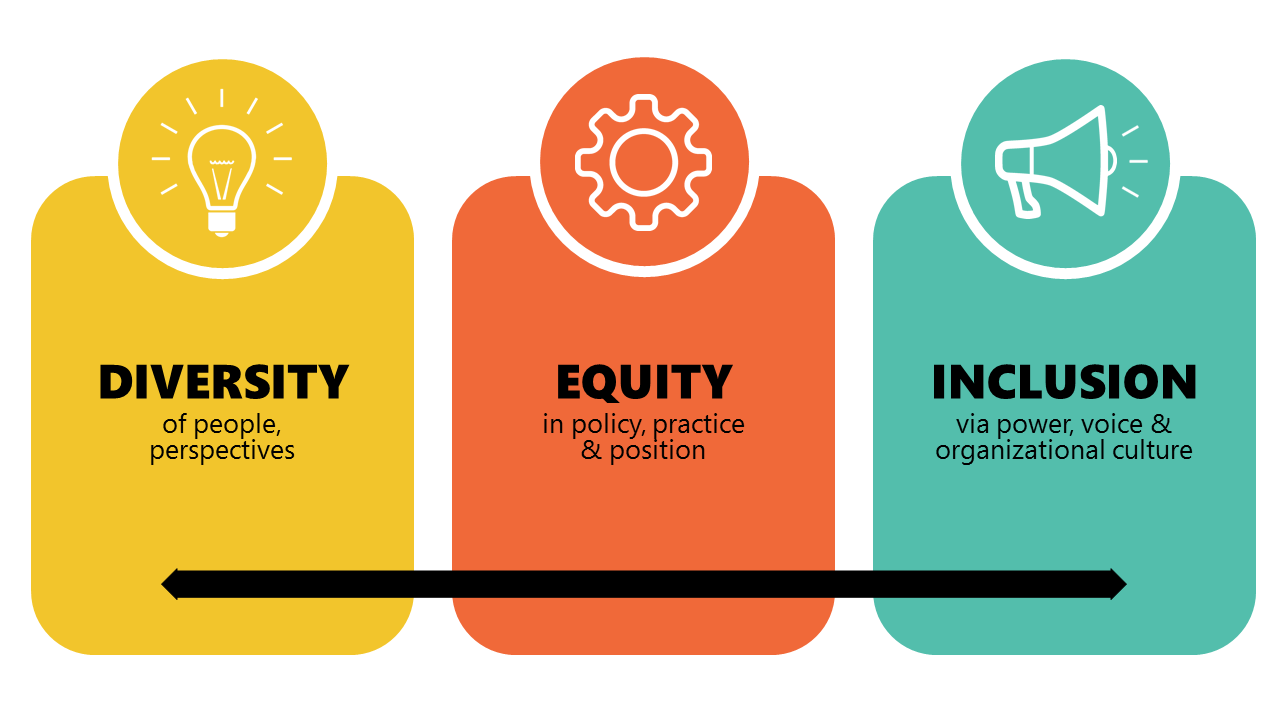Diversity, Equity and Inclusion

In today’s globalised business environment, fostering diversity, equity and inclusion (DEI) within the workplace is not only a moral imperative but also a strategic advantage. Numerous studies and business cases have demonstrated that DEI initiatives contribute to a more creative, innovative and productive workforce. As such, it's increasingly crucial for Human Resources (HR) professionals, especially those being trained in business schools, to integrate DEI strategies into the core of organisational culture and operations.
Understanding DEI in the Business Context
Diversity refers to the representation of different demographic backgrounds, including race, gender, ethnicity, age, sexual orientation, religion and disability, among other attributes.
Equity involves ensuring fair treatment, access, opportunity and advancement while striving to identify and eliminate barriers that have prevented the full participation of some groups.
Inclusion means creating a cultural and environmental feeling of belonging that allows diverse groups to be authentic, contributing members within an organisation.
Business schools offering HR degrees increasingly emphasize the importance of DEI, equipping future HR leaders with the knowledge and skills to drive change effectively. For instance, many HR curricula now incorporate case studies, simulations and discussions that focus on successful DEI programmes and the challenges associated with them.
The Business Case for DEI
A diverse workforce can capture a greater share of the consumer market by reflecting the demographic diversity of the customer base. For example, companies like Coca-Cola and Procter & Gamble have leveraged workforce diversity to better understand and cater to global markets. Moreover, diverse teams are known to be more innovative.
From a talent acquisition and retention perspective, a strong DEI reputation enhances a company’s attractiveness to a wider pool of candidates. Young professionals, in particular, are increasingly looking for workplaces that value inclusivity and diversity.
Strategies for Fostering an Inclusive Organisational Culture
Implementing effective DEI practices requires a systematic approach tailored to the specific needs and contexts of each organisation. Below are some practical strategies that HR professionals can adopt:
Leadership Commitment and Role Modeling: DEI must start at the top. Leadership commitment is crucial as leaders set the tone for the organisation’s culture and priorities.
Comprehensive Training and Education: Training should also address unconscious biases, teaching employees to recognise and mitigate their biases.
Recruitment and Hiring Practices: Implement structured interviews and standardised evaluation criteria to minimise biases. Expand recruitment efforts to a broader range of schools, communities and platforms to ensure a diverse pool of applicants.
Mentoring and Sponsorship Programmes: Develop mentoring programmes that pair leaders with employees from underrepresented groups, and sponsorship is crucial as sponsors can advocate for the career advancement of their mentees.
Inclusive Policies and Practices: Regularly review company policies for hidden biases, such as those in performance reviews, promotions, and pay. Adopt flexible work policies that accommodate different cultural, religious and personal needs.
Measurement and Accountability: Hold leaders and managers accountable for meeting DEI objectives through performance reviews and compensation.
Employee Resource Groups (ERGs) and Inclusion Councils: Support and fund ERGs that allow employees from various backgrounds to connect and support each other. Create an inclusion council that represents a cross-section of the organisation to advise on DEI matters and promote inclusivity.
Continuous Feedback and Improvement: Implement regular surveys and feedback mechanisms to understand employee experiences and areas needing improvement, and be open to making ongoing adjustments to DEI strategies based on feedback and changing societal norms.
For business schools, the integration of DEI principles into HR degree programmes is not merely an academic requirement but a fundamental aspect of preparing future leaders for the dynamically diverse workforce of the twenty-first century. By embedding DEI into the curriculum, business schools ensure that aspiring HR professionals understand the complexity and significance of these initiatives. Such educational grounding empowers them to champion inclusive practices and drive meaningful change in their future workplaces.
The importance of DEI extends beyond the ethical imperative; it encompasses a comprehensive business strategy that impacts innovation, market reach, talent acquisition, employee satisfaction and ultimately financial performance. As global markets become increasingly interconnected and diverse, the need for adept leaders who can navigate and leverage this diversity will continue to grow. Businesses that commit to robust DEI practices are not only setting a standard for social responsibility but are also positioning themselves competitively for long-term success.
By fostering an inclusive culture, organisations ensure that all employees feel valued and respected, which enhances employee engagement and productivity. Effective DEI practices can also reduce workplace conflicts and improve team collaboration by promoting a deeper understanding and appreciation of diverse perspectives.
DEI is a crucial component of modern business strategy and organisational health. By prioritising and effectively managing DEI initiatives, businesses not only create a workplace where diverse talents can thrive but also cultivate an environment that mirrors the society we aspire to create—one marked by fairness, opportunity and mutual respect. Business schools play a pivotal role in this transformative process by shaping the inclusive leaders of tomorrow.



